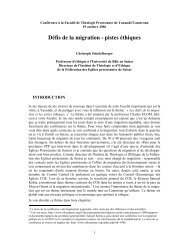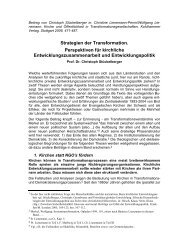BREAK THE CHAINS OF OPPRESION AND THE YOKE OF ...
BREAK THE CHAINS OF OPPRESION AND THE YOKE OF ...
BREAK THE CHAINS OF OPPRESION AND THE YOKE OF ...
You also want an ePaper? Increase the reach of your titles
YUMPU automatically turns print PDFs into web optimized ePapers that Google loves.
Ethics 2. Performance-related justice means that every person and institution involved<br />
in human activities (such as the production, trade, sale or disposal of a product<br />
or service) must be given their due (e.g. salary) on the basis of their performance.<br />
This means related to climate justice: An activity which reduces<br />
greenhouse gas emissions is a good performance and should be rewarded respectively.<br />
3. Needs-related justice means that basic human needs and rights (i.e. the subsistence<br />
minimum, a life in dignity and the right to food and water) should be<br />
taken into consideration for every person and institution. This means related<br />
to climate justice: Every person has the right to survive and be supported<br />
to manage adaptation to climate change independent from his/her capability<br />
and performance.<br />
4. Distributive justice ensures that access to resources, goods and services is distributed<br />
fairly, taking into account the balance of capability, performance<br />
and needs. This means related to climate justice: Financial or other resources<br />
to decrease negative effects of climate warming on human life should be distributed<br />
first according to needs, but also taking into account performance<br />
and capabilities so that the overall disparity between people becomes smaller<br />
and not larger.<br />
5. Justice as equal treatment means that all human beings have the same human<br />
rights and the right to equal treatment independent of capabilities, performance,<br />
needs, origin and characteristics (such as gender, colour, race, religion).<br />
This means related to climate justice: Climate related measures for prevention,<br />
mitigation and adaptation have to respect equal treatment of all people<br />
affected.<br />
6. Intergenerational � justice � means � a sustainable �use �and<br />
fair distribution of resources,<br />
as well as a reduction in and a fair distribution of ecological burdens<br />
between generations living today and future generations. This means related<br />
to climate justice: Decisions have to respect the needs for a life in dignity of<br />
future generations which have the same right of equal treatment as generations<br />
living today.<br />
7. Participatory justice means the fair, appropriate participation in decisionmaking<br />
of all those affected by a problem and by decisions. This means related<br />
to climate justice: Decisions on climate related policies should be taken<br />
by democratic participation of the population and its representatives on the<br />
different levels, from local to global.<br />
8. Procedural justice means calculable, constitutional (publicly and privately)<br />
regulated, transparent, corruption-free and thus fair procedures in all interactions.<br />
This means related to climate justice: The decisions related to climate<br />
warming and its implementations (such as access to financial resources,<br />
climate related taxes or incentives, media information) have to follow the<br />
mentioned criteria of procedural justice.<br />
������������������������������������������������<br />
� � � � ����������������������� �<br />
84<br />
– CLIMATE JUSTICE <strong>AND</strong> TAX JUSTICE –










